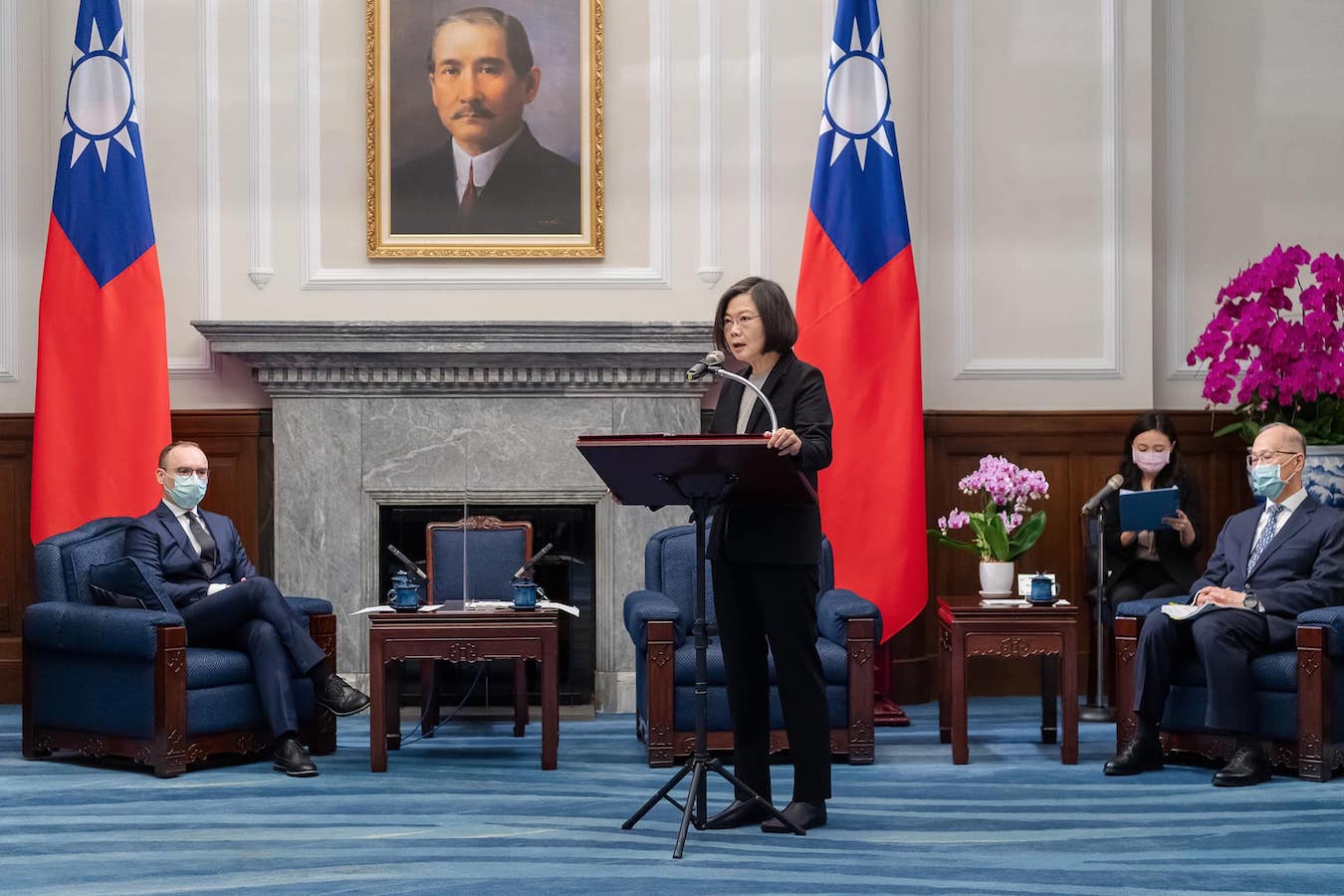by Brian Hioe
語言:
English
Photo Credit: Tsai Ing-wen/Facebook
THE CHINESE GOVERNMENT recently announced that it would be downgrading relations with Lithuania, in withdrawing its ambassador from the eastern European nation. Following this, China will no longer continue to conduct relations at the ambassador level with Lithuania.
This action takes place shortly after Taiwan opened a representative office in Lithuania, which is known as the Taiwanese Representative Office in Lithuania. The use of “Taiwan” in the name of the office is notable, seeing as other representative offices use the word “Taipei” in their name because of opposition from China. This is the first representative office in Europe to use the word “Taiwan” in its name in this way.
 President Tsai Ing-wen meeting with Lithuanian lawmakers. Photo credit: Tsai Ing-wen/Facebook
President Tsai Ing-wen meeting with Lithuanian lawmakers. Photo credit: Tsai Ing-wen/Facebook
It is a question as to whether other retaliatory moves will follow suit from China. Withdrawing its ambassador from Lithuania and conducting diplomatic relations through lower-ranked officials may be primarily symbolic, more than anything else. Chinese state-run tabloid Global Times has also attacked Lithuania as barely meeting the qualifications for a nation-state and published an editorial suggesting that Russia would be justified in annexing Lithuania.
Nevertheless, China could potentially seek to reduce trade with Lithuania or even issue some form of sanction as a response to Lithuania upgrading its relations with Taiwan. China is also signaling that it will downgrade relations with countries that upgrade relations with Taiwan even if, through allowing a representative office to use the word “Taiwan” in its name or sending a diplomatic visit, this is far from establishing official diplomatic recognition of Taiwan.
On the other hand, it is not impossible that Lithuania or other such countries will be pushed to further upgrade relations with Taiwan if China hits back, as a form of diplomatic tit-for-tat escalation. In particular, eastern European countries that were formerly part of the Soviet bloc may see part of their own history in Taiwan, and so Chinese actions may, in fact, hit close to home for such countries—making it expedient for politicians from these countries to call for further strengthening relations with Taiwan.
Taiwan has seen strengthened relations with a number of central European and eastern European countries lately, including Lithuania, Slovakia, Poland, and the Czech Republic. It is thought that such countries have decided to strengthen relations with Taiwan because of weaker trade ties with China compared to western European countries that have shrugged off pressure to decouple with China. Such countries also are reliant on the US for security against the geopolitical threat of China. Consequently, strengthening ties with Taiwan is also a way to strengthen ties with the US, something that may be illustrative of how US-Taiwan relations are perceived internationally at present.
Interestingly enough, the US government-run Export-Import Bank has promised a 600 million USD loan to Lithuania to offset the economic impact of deteriorating relations with China. It is also worth speculating as to whether the US will take this course of action with other countries that may be economically impacted because they decide to pursue strengthening relations with Taiwan, effectively footing the bill for diplomatic relations with Taiwan.
 Photo credit: Tsai Ing-wen/Facebook
Photo credit: Tsai Ing-wen/Facebook
If so, one expects China to accuse the US of conducting dollar diplomacy on behalf of Taiwan. That being said, one notes that seeking to encourage countries from maintaining diplomatic relations with Taiwan or strengthening diplomatic relations with Taiwan can be understood as one of the roles of the TAIPEI Act. And, as reflective of how Taiwan’s diplomatic space has expanded internationally, Taiwan has increasingly seen diplomatic visits by US elected representatives since the Biden administration took power, including a visit last week by a primarily Democratic delegation. Taiwan also recently saw a visit by European Union (EU) parliamentarians under the auspices of an EU committee on disinformation, a similar time frame to a tour of Europe by Minister of Foreign Affairs Joseph Wu and Taiwanese trade representatives.
Either way, the US may intend to cement economic ties with other countries in order to increase the political incentive for such countries to align with it against China. This was the role that the TPP would have originally played vis-a-vis the Asia Pacific before the Trump administration unilaterally withdrew from the TPP in the first days of its administration, in line with the protectionist backlash against free trade that it rode into power on. In a time that some have described as a “new Cold War” against China, it may not be surprising for the US to use Taiwan as an issue that provides a convenient vehicle for strengthening political and economic ties with potential allies.

